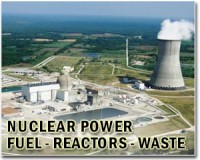 |
Washington (AFP) April 4, 2011 US anti-nuclear groups Monday condemned a project to built a plant where plutonium from weapons would be reprocessed for use as fuel in nuclear power plants, saying the plan was costly, dangerous and would benefit mainly French group, Areva. A mixed-oxide, or MOX, plutonium reprocessing plant that is being built in South Carolina has become "an expensive effort that enriches contractors, led by the French government-owned company Areva," Tom Clements of Friends of the Earth said at the launch of a report by an anti-nuclear alliance. Areva launched construction of the US reprocessing plant in partnership with construction company Shaw in 2007. The plant, on the Department of Energy's Savannah River site, is roughly one-third finished and already three times over budget, with a price tag so far of $4.9 billion dollars, Clements said. But even though the unfolding nuclear disaster in Japan has highlighted the dangers of MOX fuel -- which Clements says was used in at least one of the reactors at Japan's crippled Fukushima power plant -- the US government is doing nothing to stop construction of the facility, Clements told reporters. "As plutonium leaks from the damaged reactors in Japan, the US Department of Energy (DoE) continues planning for the use of dangerous mixed-oxide uranium-plutonium fuel in US nuclear reactors of the same design as the Fukushima reactors in Japan," Clements said. He also said that MOX fuel derived from reprocessed weapons-grade plutonium has never been used anywhere on a commercial scale. But Areva spokesman Jarret Adams told AFP that there was "not a significant difference" between weapons-derived MOX fuel and MOX made from recycled nuclear fuel, the latter of which is being used "in about 40 reactors in five different countries." Adams defended the US fuel reprocessing plant being built by Areva and Shaw as an "important project to help convert former weapons material into usable material for US power plants. "It removes former weapons material from possible future use," Adams said. Anti-nuclear activists would prefer encasing the plutonium left over from the US dismantlement of its nuclear weapons in glass, and then storing it as high-level waste. That method, called vitrification, is "cheaper, quicker and safer" than converting plutonium into MOX fuel, says the report released Monday by the Alliance for Nuclear Accountability, a network of three dozen organizations.
Share This Article With Planet Earth
Related Links Nuclear Power News - Nuclear Science, Nuclear Technology Powering The World in the 21st Century at Energy-Daily.com
 Japan crisis fuels India nuclear safety concerns
Japan crisis fuels India nuclear safety concernsNew Delhi (AFP) April 4, 2011 Japan's nuclear crisis has fuelled public unease in India over ambitious government plans to ramp up nuclear power capacity to feed the country's growing, energy-hungry economy. India - both a civilian and a military nuclear power - currently has 20 reactors. It plans to spend an estimated $175 billion to buy an additional 21 foreign reactors to reach a nuclear power capacity of 63,000 ... read more |
|
| The content herein, unless otherwise known to be public domain, are Copyright 1995-2010 - SpaceDaily. AFP and UPI Wire Stories are copyright Agence France-Presse and United Press International. ESA Portal Reports are copyright European Space Agency. All NASA sourced material is public domain. Additional copyrights may apply in whole or part to other bona fide parties. Advertising does not imply endorsement,agreement or approval of any opinions, statements or information provided by SpaceDaily on any Web page published or hosted by SpaceDaily. Privacy Statement |